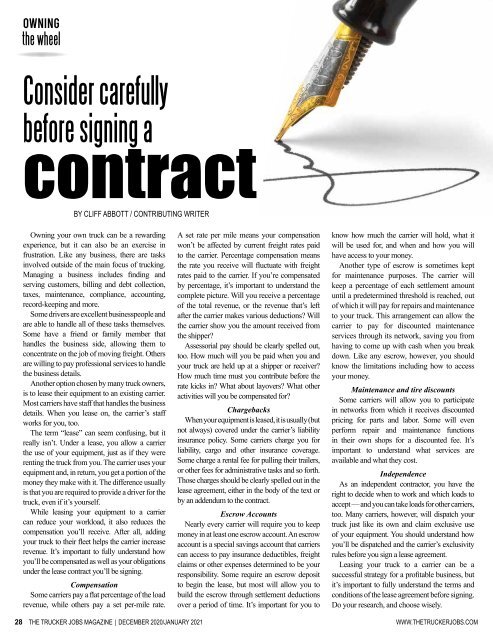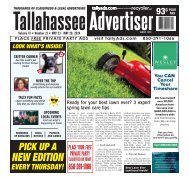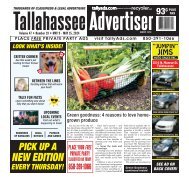2012_TTJM_AllPages
You also want an ePaper? Increase the reach of your titles
YUMPU automatically turns print PDFs into web optimized ePapers that Google loves.
Owning<br />
the wheel<br />
Consider carefully<br />
before signing a<br />
contract<br />
BY cliff abbott / Contributing WRITER<br />
Owning your own truck can be a rewarding<br />
experience, but it can also be an exercise in<br />
frustration. Like any business, there are tasks<br />
involved outside of the main focus of trucking.<br />
Managing a business includes finding and<br />
serving customers, billing and debt collection,<br />
taxes, maintenance, compliance, accounting,<br />
record-keeping and more.<br />
Some drivers are excellent businesspeople and<br />
are able to handle all of these tasks themselves.<br />
Some have a friend or family member that<br />
handles the business side, allowing them to<br />
concentrate on the job of moving freight. Others<br />
are willing to pay professional services to handle<br />
the business details.<br />
Another option chosen by many truck owners,<br />
is to lease their equipment to an existing carrier.<br />
Most carriers have staff that handles the business<br />
details. When you lease on, the carrier’s staff<br />
works for you, too.<br />
The term “lease” can seem confusing, but it<br />
really isn’t. Under a lease, you allow a carrier<br />
the use of your equipment, just as if they were<br />
renting the truck from you. The carrier uses your<br />
equipment and, in return, you get a portion of the<br />
money they make with it. The difference usually<br />
is that you are required to provide a driver for the<br />
truck, even if it’s yourself.<br />
While leasing your equipment to a carrier<br />
can reduce your workload, it also reduces the<br />
compensation you’ll receive. After all, adding<br />
your truck to their fleet helps the carrier increase<br />
revenue. It’s important to fully understand how<br />
you’ll be compensated as well as your obligations<br />
under the lease contract you’ll be signing.<br />
Compensation<br />
Some carriers pay a flat percentage of the load<br />
revenue, while others pay a set per-mile rate.<br />
A set rate per mile means your compensation<br />
won’t be affected by current freight rates paid<br />
to the carrier. Percentage compensation means<br />
the rate you receive will fluctuate with freight<br />
rates paid to the carrier. If you’re compensated<br />
by percentage, it’s important to understand the<br />
complete picture. Will you receive a percentage<br />
of the total revenue, or the revenue that’s left<br />
after the carrier makes various deductions? Will<br />
the carrier show you the amount received from<br />
the shipper?<br />
Assessorial pay should be clearly spelled out,<br />
too. How much will you be paid when you and<br />
your truck are held up at a shipper or receiver?<br />
How much time must you contribute before the<br />
rate kicks in? What about layovers? What other<br />
activities will you be compensated for?<br />
Chargebacks<br />
When your equipment is leased, it is usually (but<br />
not always) covered under the carrier’s liability<br />
insurance policy. Some carriers charge you for<br />
liability, cargo and other insurance coverage.<br />
Some charge a rental fee for pulling their trailers,<br />
or other fees for administrative tasks and so forth.<br />
Those charges should be clearly spelled out in the<br />
lease agreement, either in the body of the text or<br />
by an addendum to the contract.<br />
Escrow Accounts<br />
Nearly every carrier will require you to keep<br />
money in at least one escrow account. An escrow<br />
account is a special savings account that carriers<br />
can access to pay insurance deductibles, freight<br />
claims or other expenses determined to be your<br />
responsibility. Some require an escrow deposit<br />
to begin the lease, but most will allow you to<br />
build the escrow through settlement deductions<br />
over a period of time. It’s important for you to<br />
know how much the carrier will hold, what it<br />
will be used for, and when and how you will<br />
have access to your money.<br />
Another type of escrow is sometimes kept<br />
for maintenance purposes. The carrier will<br />
keep a percentage of each settlement amount<br />
until a predetermined threshold is reached, out<br />
of which it will pay for repairs and maintenance<br />
to your truck. This arrangement can allow the<br />
carrier to pay for discounted maintenance<br />
services through its network, saving you from<br />
having to come up with cash when you break<br />
down. Like any escrow, however, you should<br />
know the limitations including how to access<br />
your money.<br />
Maintenance and tire discounts<br />
Some carriers will allow you to participate<br />
in networks from which it receives discounted<br />
pricing for parts and labor. Some will even<br />
perform repair and maintenance functions<br />
in their own shops for a discounted fee. It’s<br />
important to understand what services are<br />
available and what they cost.<br />
Independence<br />
As an independent contractor, you have the<br />
right to decide when to work and which loads to<br />
accept — and you can take loads for other carriers,<br />
too. Many carriers, however, will dispatch your<br />
truck just like its own and claim exclusive use<br />
of your equipment. You should understand how<br />
you’ll be dispatched and the carrier’s exclusivity<br />
rules before you sign a lease agreement.<br />
Leasing your truck to a carrier can be a<br />
successful strategy for a profitable business, but<br />
it’s important to fully understand the terms and<br />
conditions of the lease agreement before signing.<br />
Do your research, and choose wisely.<br />
28 the trucker jobs magazine | DECEMBER 2020/JANUARY 2021 www.TheTruckerjobs.com

















